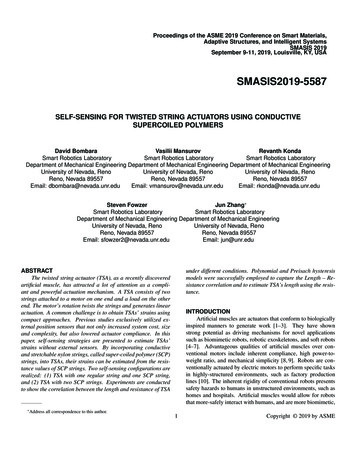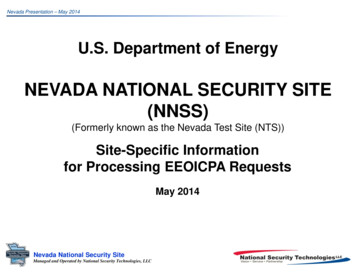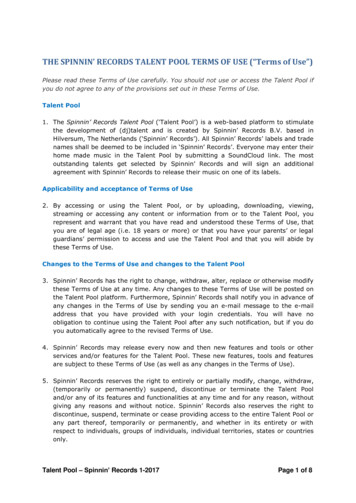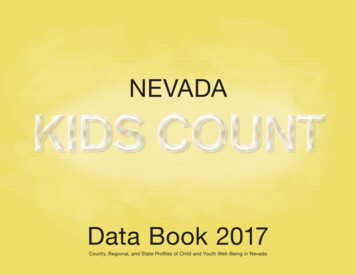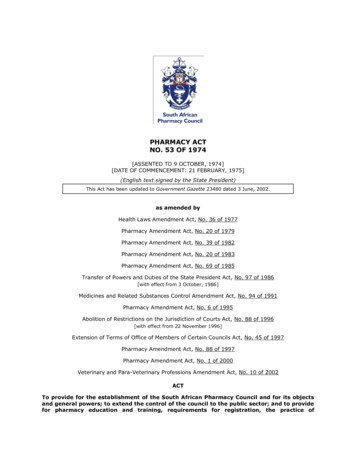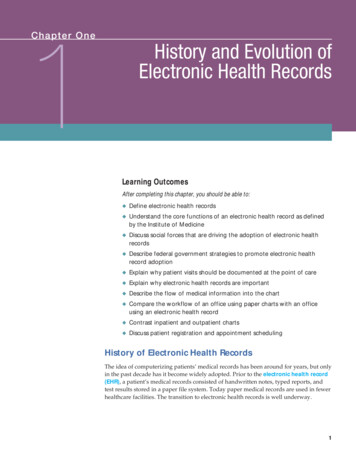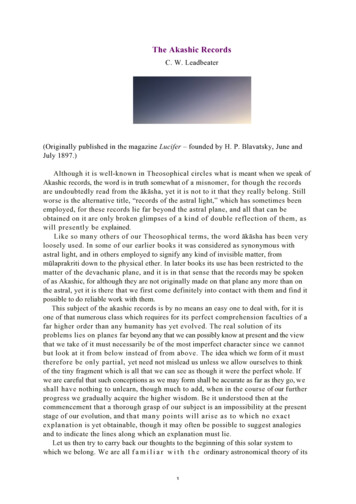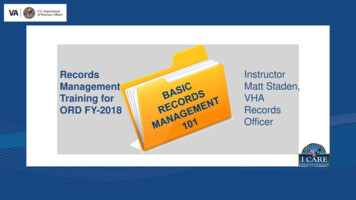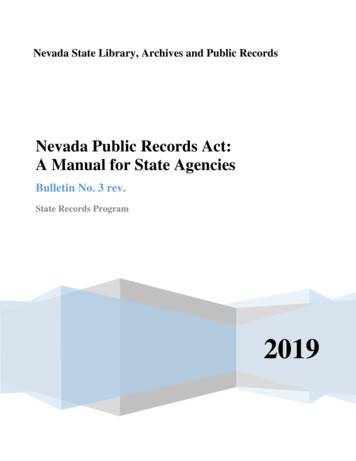
Transcription
Nevada State Library, Archives and Public RecordsNevada Public Records Act:A Manual for State AgenciesBulletin No. 3 rev.State Records Program2019
Tod Colegrove, AdministratorAdopted by Reference, in accordance with NAC 239.8692019
2019TABLE OF CONTENTSNevada’s Public Records Act 1Scope of Public Records Manual 2Who is Subject to this Manual? 2Non-Compliance with an Inspection Request 3Good Faith Response 3Managing Records 4What is an Official Record? 4Retention and Disposition Schedules 5Failure to properly manage Official Records 6Is it okay for me to maintain records on my personal computer devices? 6Public Records 6Is it a Public Record? 6Request must be for an identifiable record 7Not required to create a public record 7Request for information is not a public records request 7Computer software is not a public record 7Role of the Attorney General 7Transitory records 8Nonrecord material 8Nonrecord retention guidelines 8Convenience copies 8Drafts 8Reference files 9Personal papers 9Copyrighted material 9Confidential and Restricted Records 10NRS Confidential Citations 10Role of the Attorney General 11Balancing test analysis 11Each Agency Must Adopt a Policy 11Agency Responsibilities 12Agency Records Official 12Records Request Form 13Posting on the Agency Website 14When a Request is Received 14Readily available records 14Assisting the Requester 15Locating Records 15Role of the Attorney General 16Responding to a Request 16Disclosure 16Request to Inspect public records: 16Request a copy of public records: 16
Redaction 17Redaction prior to inspection 18Denials 18Destruction Hold 19Fees 19Role of the Attorney General 20Posting a list of fees 20Actual costs 20Fee deposit 21Payment before release of copies 21Waiving fees 21Extraordinary Use Fees 22Extraordinary Use must be defined in Policy 22Additional Extraordinary Request for the same record 23Geographic Information System (GIS) 23Use of Outside Copying Service 23Minutes and recordings of public meetings 24Request Deadlines 24Request Received – Day 0 25Response – Day 1 to Day 5 25Appealing denials 26Subpoenas 27Public Records log 27Retention 27Court Decisions 28Summary 28Public Record Form Samples 29Public Records Request form 29Fulfill: Public Records Request Acknowledgement Letter form 29Denial: Public Records Request Acknowledgement Letter 29Please contact your assigned Deputy Attorney General for moreinformation about The Nevada Public Records Act.
THE NEVADA PUBLIC RECORDS ACT (NPRA)The Public Records Act (Act) is found in NRS Chapter 239. Nevada’s Public Records Law was enacted to ensurethat government documents are available to the public. The Legislature’s intent is clear:NRS 239.001 Legislative findings and declaration. The Legislature hereby finds and declares that:1. The purpose of this chapter is to foster democratic principles by providing members of the publicwith access to inspect and copy public books and records to the extent permitted by law;2. The provisions of this chapter must be construed liberally to carry out this important purpose;3. Any exemption, exception or balancing of interests which limits or restricts access to public booksand records by members of the public must be construed narrowly; and4. The use of private entities in the provision of public services must not deprive members of thepublic access to inspect and copy books and records relating to the provision of those services.5. If a public book or record is declared by law to be open to the public, such a declaration does notimply, and must not be construed to mean, that a public book or record is confidential if it is notdeclared by law to be open to the public and is not otherwise declared by law to be confidential.The Nevada Public Records Act 1 (NPRA) applies to “all public books and public records of a government entity,the contents of which are not otherwise declared by law to be confidential.” The records “must be open at alltimes during office hours to inspection by any requester and may be fully copied.” Also, “A person may request acopy of a public record in any medium 2 in which the public record is readily available.” 3The presumption is, all agency records are open to public inspection and copying, unless they are specificallydeclared by law to be confidential.Each agency is required to maintain the records used in transacting public business 4, and to permit publicinspection or copying of those records to the public when requested.NAC 239.696 Records management program: Establishment. A state agency shall establish a recordsmanagement program which documents its organization, functions, policies, decisions, procedures andessential transactions.NAC 239.697 Records management program: General requirements. The records managementprogram established pursuant to NAC 239.696 must include controls for the creation, maintenance, use,security and distribution of the records of the state agency to ensure that the state agency:1. Refrains from accumulating unnecessary records or gathering information which is not essentialto the proper functioning of the state agency;2. Adheres to the appropriate schedule;3. Maintains its records in a manner which is cost-effective and which allows for the rapid retrievaland protection of the information contained within that record;4. Establishes and documents standards for a filing system for the state agency;NRS 239.010NAC 239.861 “Readily available medium” interpreted3NAC 239.860 “Readily available” interpreted4NAC 239.69612Nevada State Library, Archives and Public RecordsNevada Public Records Act: A Manual for State Agencies – 20191
5. Provides for the transfer of its records which are of historical value to the State Archives inaccordance with NRS 239.080, 239.085, 239.090 and 378.250 and NAC 239.750, 239.940 and 239.945;and6. Establishes written policies and procedures for the proper access or denial of access to the publicor other governmental agencies to records which have been declared by law to be confidential orotherwise restricted.SCOPE OF PUBLIC RECORDS MANUALThis Manual presents guidelines for agencies to use in determining which documents are subject to publicaccess under NRS Chapter 239 and discusses the procedure for handling requests for access to public records. Italso discusses the preservation and disposition of records.The general policy of Nevada with respect to public inspection of public records seeks to increase public accessto government information and to make government agencies accountable and transparent to the public. ThisManual is designed to reduce costs and make the public records request process more uniform and timelier,increasing an agency’s public accountability, openness and transparency.The purpose of this Manual is to provide a single source for rules by which an agency implements and ensurescompliance with the provisions of the Public Records Act. The provisions of this Manual shall be liberallyinterpreted and construed to promote full access to the agency’s public records in order to: Assure continuing public confidence in government,Prevent unreasonable invasions of privacy,Protect public records from damage or disorganization, andPrevent excessive interference with essential government functions.Who is Subject to this Manual?Agencies of the Executive Department of the State of Nevada are subject to this Manual. There is no centraloffice in the State that handles public records requests for state agencies. Agencies therefore receive andprocess the public records requests for the records managed by that agency.NRS 239.005(2) “Agency of the Executive Department” means an agency, board, commission, bureau,council, department, division, authority or other unit of the Executive Department of the StateGovernment. The term does not include the Nevada System of Higher Education.The Federal "Freedom of Information Act" (FOIA) does not apply to requests for the public records of the Stateof Nevada. Federal FOIA only applies to requests for public records maintained by the federal government.Requests received under FOIA should not be denied and will be processed by the agencies under the Nevada’sPublic Records Act. For more information on FOIA, see the US Department of Justice, Office of InformationPolicy. 55https://www.justice.gov/oipNevada State Library, Archives and Public RecordsNevada Public Records Act: A Manual for State Agencies – 20192
Non-Compliance with an Inspection RequestThe goal of this Manual is to obtain compliance, not to sanction. In the event of an agency’s unlawful refusal toprovide access to public records, citizens may bring civil actions in district court in order to obtain compliancewith the law. If the requester (person) prevails, the court will order the agency to produce the record(s) and paythe requester’s attorney’s fees. 6Open government is an essential element of democracy. As such, the purpose of NPRA is to foster opengovernment by making open government an obligation of Executive Branch agencies. Agencies should becautioned that a deliberate concealment of public records may result in a risk of criminal conviction, should theybe accused of violating NPRA.NRS 239.011 Application to court for order allowing inspection or copying, or requiring that copy beprovided, of public book or record in legal custody or control of governmental entity for less than 30years.1. If a request for inspection, copying or copies of a public book or record open to inspection andcopying is denied, the requester may apply to the district court in the county in which the book orrecord is located for an order:(a) Permitting the requester to inspect or copy the book or record; or(b) Requiring the person who has legal custody or control of the public book or record to provide acopy to the requester, as applicable.2. The court shall give this matter priority over other civil matters to which priority is not given byother statutes. If the requester prevails, the requester is entitled to recover his or her costs andreasonable attorney’s fees in the proceeding from the governmental entity whose officer has custody ofthe book or record.NRS 239.310 Removing, injuring or concealing public records and documents. A person who willfullyand unlawfully removes, alters, mutilates, destroys, conceals or obliterates a record, map, book, paper,document or other thing filed or deposited in a public office, or with any public officer, by authority oflaw, is guilty of a category C felony and shall be punished as provided in NRS 193.130.Good Faith ResponseA good faith decision by a public agency to release or not to release a public record relieves the agency fromliability arising from the disclosure or the refusal to disclose information. Good faith compliance is bestdemonstrated by consulting with the Office of the Attorney General or the agency’s legal counsel wheneverthere is any doubt whether the information should be disclosed. After consultation, the final decision must bemade by the public officer or employee responding to the request.NRS 239.012 Immunity for good faith disclosure or refusal to disclose information. A public officeror employee who acts in good faith in disclosing or refusing to disclose information and the employer ofthe public officer or employee are immune from liability for damages, either to the requester or to theperson whom the information concerns.6NRS 230.011Nevada State Library, Archives and Public RecordsNevada Public Records Act: A Manual for State Agencies – 20193
MANAGING RECORDSAs required by NPRA, agency heads have an explicit responsibility to create and preserve records whichdocument of the organization’s functions, policies, decisions, procedures, and essential transactions of theagency, also known as the official records of the agency. This includes records designed to furnish informationnecessary to protect the legal and financial rights of the government and of its citizens.To facilitate broader access to its public records, all agencies must organize and maintain public records in amanner which makes the records available in accordance with NPRA. For example, move official e-mailsrecords and electronic records off of email repositories and user drives to an agency electronic recordsmanagement system to make the records accessible to “need to know” agency staff and to secure and protectthe records. 7What is an Official Record?Official Record is defined in NRS 239.005(6) 8:NRS 239.005(6) “Official state record” includes, without limitation:Papers, unpublished books, maps and photographs; Information stored on magnetic tape or computer,laser or optical disc; Materials that are capable of being read by a machine, including, without limitation,microforms and audio and visual materials; and Materials that are made or received by a state agencyand preserved by that agency or its successor as evidence of the organization, operation, policy or anyother activity of that agency or because of the information contained in the material.By regulation 9 in NAC 239.705, the Nevada State Library, Archives and Public Records (NSLAPR) has interpretedthe definition of official record, public record and record:NAC 239.705 “Official state record” and “record” interpreted.1. For the purposes of NRS 239.080 and as used in NAC 239.570 to 239.750, inclusive, “official staterecord” or “record” means information created or received by a state agency under authority of law,regulation or other legal mandate or in connection with the transaction of public business that ismaintained by the state agency or its legitimate successor as evidence of the organization, functions,policies, decisions, procedures, operations or other activities of the state agency, including, withoutlimitation, all papers, maps, photographs, financial statements, statistical tabulations, recorded mediaand other documentary materials, regardless of physical form or characteristics.2. The phrase does not include nonrecord materials. Nonrecord materials include, withoutlimitation, published materials printed by a governmental printer, informal notes, unused blank formsexcept ballots, brochures, newsletters, magazines, catalogs, price lists, drafts, convenience copies, adFor more information on managing email records, see Bulletin No.1 - Guidelines for Developing an Agency Email PolicyNRS 239.0059NRS 378.255(1)78Nevada State Library, Archives and Public RecordsNevada Public Records Act: A Manual for State Agencies – 20194
hoc reports, reference materials not relating to a specific project and any other documentation thatdoes not serve as the record of an official action of a state agency.As used in NPRA, the term “all public books and public records” includes everything within in the definition ofofficial records in NRS 239.005(6), with the exception of those official records which are explicitly declaredconfidential by law.Retention and Disposition SchedulesThe Committee to Approve Schedules for the Retention and Disposition of Official State Records (State RecordsCommittee or Committee) was created in NRS 239.073 to review and approve the minimum retention periods ofofficial records. The official records created and preserved by an agency must be retained for the length of timeestablished by the Committee. Official records may only be destroyed in accordance with an approved schedule.Agency records retention schedules are made readily available to agencies and to the public on the NevadaState Library, Archives and Public Records’ website. retentionschedulesAgencies are responsible for making certain all of their records, regardless of media or format, are properlyretained and remain accessible during their entire retention period. All records must be stored in a secure andstable environment that will protect them from alteration, damage and degradation. 10Records may exist in any media including, but not limited to, paper, electronic, microfilm, and film. Records canalso be found in multiple formats such as word processing documents, spreadsheets, PDFs, html pages,database reports, email messages, photos, videos, and films. Records retention schedules apply to records inany media or format.Agencies are advised to systematically and consistently destroy records according to the retention timetable.The destruction of records must be a planned activity which occurs as part of the agency's regular course ofbusiness. Haphazard or selective destruction of records may raise suspicion concerning the reliability andauthenticity of the agency's record keeping system.NRS 239.080 State records: Schedules for retention and disposition.1. An official state record may be disposed of only in accordance with a schedule for retention anddisposition which is approved by the Committee.2. In cooperation with [NSLAPR], each agency, board and commission shall develop a schedule forthe retention and disposition of each type of official state record.3. [NSLAPR] shall submit the schedules described in subsection 2 to the Committee for finalapproval.Stopping Destruction. If a record is scheduled for destruction by an approved records retention schedule andthe record is included in a public records request, audit, investigation, litigation, or anticipated litigation, therecord must be retained until the request, audit, investigation, litigation, or anticipated litigation is completed.Failure to stop the destruction of records pursuant to this section could result in penalties. 111011NAC 239.699NRS 239.310Nevada State Library, Archives and Public RecordsNevada Public Records Act: A Manual for State Agencies – 20195
Failure to Properly Manage Official RecordsRecords created or received in connection with the transaction of public business are official records and areowned by the State of Nevada. Records document the conduct of government business and must be filed in away that allows for easy access to these records over time. Records shall not be prematurely destroyed. It isrecommended the records not be retained long past the retention period.The Legislature has made it clear, failure to retain records in accordance with an approved schedule may resultin a reprimand or in a more severe disciplinary action up to and including criminal penalties:NRS 239.083(4) The head of an agency, board or commission that is required to maintain its officialstate records in accordance with a schedule for the retention and disposition of official state recordsthat has been developed pursuant to NRS 239.080 and approved by the Committee pursuant to NRS239.077:(a) Except as otherwise provided in paragraph (b), shall issue a letter of reprimand to any employeeof the agency, board or commission, as applicable, who knowingly and willfully disposes of an officialstate record of the agency, board or commission in a manner contrary to the approved schedule for theretention and disposition of the official state records of the agency, board or commission.(b) In lieu of a letter of reprimand issued pursuant to paragraph (a), may take more severedisciplinary action against an employee in a matter involving a repeated offense or where circumstancesotherwise warrant such action.Is it okay for me to maintain records on my personal computer devices?Agency staff should not store any state records on personal computers or devices. If state records are onpersonal devises or personal devices are used to conduct state business, these devices may be subject todisclosure under NPRA or subject to discovery in litigation.Likewise, it is best to maintain personal records on personal devices. Personal records should only be retainedon state-owned devices for a limited period of time (if allowed by the agency policy).PUBLIC RECORDSNPRA applies to “all public books and public records of a government entity, the contents of which are nototherwise declared by law to be confidential.” Public Record is not a statutorily defined term. Public records areretained by each agency to document the discharge of that agency’s official duties.Is it a Public Record?Many factors contribute to the determination of public records. If the answer to any of the following questionsis “yes,” it is a public record. If you are uncertain, then treat it as a public record. Did the agency require creation or submission and maintenance of the record?Was the record used to conduct or facilitate agency business?Was the record distributed to other offices or agencies for formal approval or reporting purposes?Does the record document official business action, such as: what happened, what was decided, whatadvice was given, who was involved, when it happened, and/or the order of events and decisions?Nevada State Library, Archives and Public RecordsNevada Public Records Act: A Manual for State Agencies – 20196
Request Must Be for an Identifiable RecordA public record is any record that is prepared, used, or maintained by any state agency in the course ofgoverning or performing a governmental function. A request should be for an identifiable record that exists atthe time of the request. An identifiable record is a contract, an invoice, a letter, a final report, etc.Not Required to Create a Public RecordNPRA does not require an agency to create data or generate new documents to respond to a public recordsrequest. A request applies only to existing records. An agency is not required to organize data to create a recordthat does not exist at the time of the request. There is also no requirement to reconstruct a record that waslawfully destroyed prior to receipt of the request.NAC 239.867 No requirement to create public record that does not exist. If a person requests toinspect, copy or receive a copy of a public record that does not exist, a records official or an agency ofthe Executive Department is not required to create a public record to satisfy the request.An agency is not required to provide access to records that were not identified within the request. An agencydoes not "deny" a request when it does not provide records that are outside the scope of the request becausethey were never asked for.Request for Information is not a Public Records RequestA request for general information, such as to answer a question, is not a public records request and is notsubject to NPRA. For example, asking a records official how the agency handles a job application is not a requestfor an identifiable record. There is no obligation to conduct research, fill out checklists, or answer questions in apublic records request.Computer Software is not a Public RecordComputer software developed by the government is not a public record, but the computer software maygenerate public records. 12 The software can generate public records which are deemed to exist so long as acomputer is already programmed to generate these records. In such situations, the Nevada Supreme Court hasrequired the agency to produce and disclose that information. 13Role of the Attorney GeneralIt is reasonable for an agency to consult with legal counsel when presented with extraordinary or legallycomplex requests for public records. And it is very important to consult with legal counsel when an agency12Nevada Attorney General Opinion No. 89-1 Public Records; Computer Programs; Wildlife13See LVMPD v. Blackjack Bonding, 121 Nev. Adv. Op. 10, 343 P.3d 608 (2015).Nevada State Library, Archives and Public RecordsNevada Public Records Act: A Manual for State Agencies – 20197
receives a request for public records that the agency believes may be pertinent to a potential or pending legalclaim or litigation against the agency.Transitory RecordsCertain records, including certain email, known as transitory (temporary) records, may be public records, butbecause of their limited value, they do not have to be retained. These transitory records are created primarilyfor the informal communication of information and do not require an official action. Transitory records do notset policy, establish guidelines or procedures, discuss a business matter, discuss a decision, certify a transaction,or act as evidence of receipt. Transitory records may be treated as having routine or short-term value that endswhen the reference or business purpose of the record is complete. Transitory records may be destroyed whenthe value of the record ends. An example is an all-office e-mail reminding employees of a staff meetingscheduled for later that week. Once the staff meeting is over, the e-mail reminder no longer has a businesspurpose and can be destroyed. However, if a public records request is received for a transitory record before thattransitory record has been destroyed, that transitory recor
239.085, 239.090 and 378.250 and NAC 239.750, 239.940 and 239.945; and 6. Establishes written policies and procedures for the proper access or denial of access to the public
